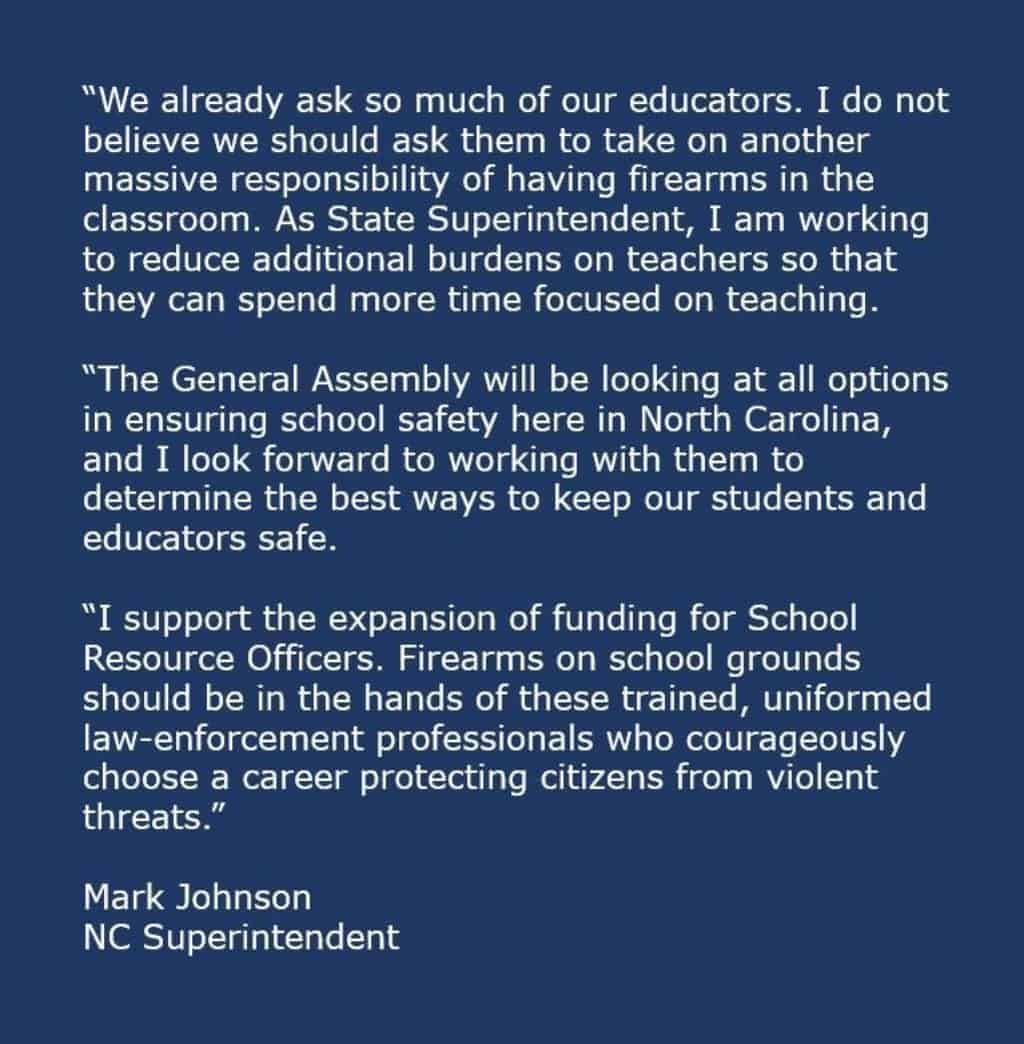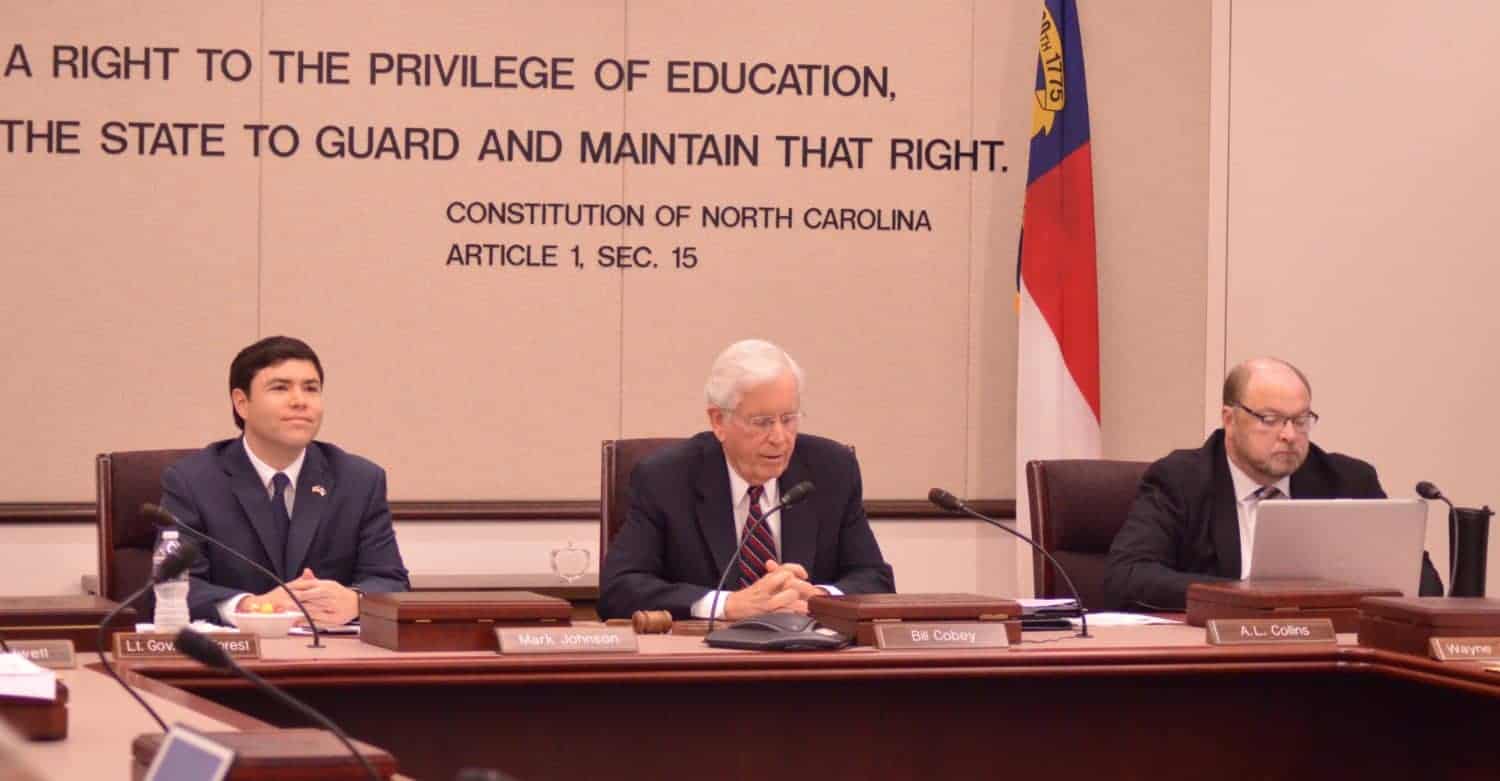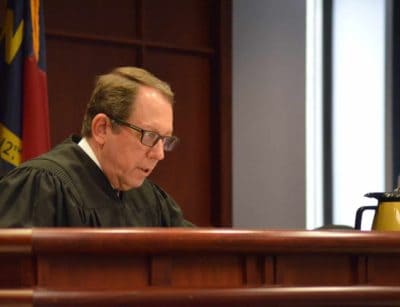Superintendent Mark Johnson said he could not endorse the State Board’s list of supplemental budget priorities during the first day of the State Board of Education’s two-day March meeting. His complaint Wednesday was that he had never seen them before.
“I cannot sign off on support for this because this is the first time I’m seeing this,” he said.
The supplemental budget priorities are sent by the State Board and other state agencies to the governor’s office so he can put together an amended budget for the second year of the biennium that will be considered during the spring short session of the General Assembly. But Johnson said his staff had been told by State Board staff that his office should not be involved.
“I have been in touch with the state budget director, and I will be submitting my own request,” he said.
Board Member Tricia Willoughby said she was surprised to hear this.
“I’m shocked because in my time on this Board…we’ve always done this collaboratively,” she said.
Adam Levinson, the state’s Chief Financial Officer and the one making the presentation about the Board’s budget priorities, said in a meeting Thursday that not including the superintendent was unintentional.
“There seems to be a misunderstanding,” he said. “And we’re working through it.”
Board Member Greg Alcorn, who chairs the committee that handled the supplemental budget recommendations, said in an e-mail that the superintendent is welcome to all discussions and meetings but has chosen not to attend.
Despite not having seen the details of the State Board’s supplemental budget request until Wednesday, Johnson said one problem jumped out at him now that he had a chance to look.
“Where in here do we specifically talk about preventing the upcoming budget cuts to this department?” he asked the Board. “That has been a topic of conversation by this Board for over six months now.”
Board Member Wayne McDevitt said he thought the supplemental budget request was separate from the budget cuts, and he was under the impression that the Board was waiting on Johnson.
“I thought we were awaiting your recommendations on the cuts. I may be wrong about that,” he said.
See the Board’s full recommendations here.
The Board voted to approve the recommendations.
The aftermath of a school shooting
Board Chair Bill Cobey started off Wednesday’s meeting with a moment of silence for the victims of the recent high school shooting in Florida, a topic that came up a few times that day.
Just prior to the State Board hearing a report on crime, discipline, and dropouts in schools, Willoughby gave her thoughts on the recent shootings and what should be done to prevent them.
“We’ve had enough school violence cumulatively, but just look at this year. I know we’re all dismayed by it,” she said. “What happened in Florida on Valentine’s Day has given us all sleepless nights.”
She went on to suggest that “military assault rifles” and high capacity magazines should be outlawed for the general public. She said that when the state was concerned about the safety of teenage drivers, it sought to make the process of getting a license more rigorous. She argued the state should do something now in reaction to the gun violence in Florida. She also praised the high-school shooting survivors who have been speaking out.
“They are very courageous and I hope that we will follow their lead,” she said.
Later, Board Vice Chair Buddy Collins took a moment to say publicly that he did not endorse what Willoughby had to say on the issue.
On Thursday, Johnson released his latest video to teachers, asking them to take the NC Educators Perspective Survey this month and give their opinions about firearms in the classroom.
Johnson has come out in opposition to the idea of allowing teachers to carry guns as a way of preventing mass shootings. He released the following comments.


Crimes and discipline in schools
The State Board heard a presentation on crimes and violence in schools, as well as the numbers of short- and long-term suspensions, and the dropout rate.
Overall, there was less reported crime and violence in the 2016-17 school year than in the year before. The total number of crimes reported dropped by 1.9 percent. In 2016-17, 9,834 offenses were reported, down from 10,020 in 2015-16.
Short- and long-term suspensions and expulsions also went down. Short-term suspensions went down by 3.9 percent, while long-term suspensions went down by 32.9 percent. A total of 18 students were expelled from state schools in 2016-17, which amounts to a 33.3 percent decrease from the previous year. The dropout rate went up slightly from 2.29 percent to 2.31 percent.
“This report gives us good context as we continue to explore ways to make schools a safe environment for every student and educator,” Johnson said.
But Collins struck a note of caution on the data.
“Anytime we set up goals that give schools credit for not reporting crimes or suspending students, then we sometimes don’t get the real data,” he said.
Lisa Godwin, the North Carolina Teacher of the Year for 2017 and member of the State Board in an advisory role, said during the meeting that she believes the data may be a little skewed. She said that sometimes she does not report behavior for certain students because they would be suspended all the time and need to be in school. She also said that the state is falling short when it comes to mental health. She said the recommended ratio for school counselors and social workers is one for every 250 students, but that in North Carolina last year the ratios for both positions fell far short of that ideal.
“We have to be a body that wants to heal our students,” she said.
The state Principal of the Year and Board advisor Jason Griffin said that educators on the ground struggle with how to address incidents in schools. He said that over the past two weeks, there has been an increase in aggressive behaviors and communicated threats from students in his district (Perquimans County Schools). The challenge is that it is not always clear what is really a threat, he said.
“With everything that’s happened in Florida, what do we discipline? What do we not?” he asked.
Innovative School District update
Last month, Eric Hall, the superintendent of the Innovative School District (ISD) said he could not recommend either of the two management organizations vying to run Southside Ashpole Elementary, the Robeson County school that has been the first picked to join the ISD.
The two applicants are Charlotte-based Achievement for All Children and Michigan’s The Romine Group.
Hall said he has been working with them since last month, allowing them to submit supplemental materials to their pitches, and he expects to have a recommendation for the State Board next month. He commended the applicants on their perseverance.
“They easily could have stepped away and said we’re not interested,” he said.
Southside-Ashpole is expected to start up under its new management by August of this year, a timeline that worried Board Member Becky Taylor.
“I really do not think we can wait as a board until April to hear the recommendation,” she said.
Hall will have his recommendation well before April, and Taylor asked that a special meeting of the State Board be called, likely via conference call, so that Board members can hear the recommendation well ahead of their next meeting.
Cobey directed Hall to work with Taylor and others to set up the call.
Under the Innovative School District, five schools will ultimately be chosen to be taken over by operators which could include for-profit charter or education management organizations. The schools will no longer be run by their traditional school districts for the duration of their time in the ISD.



